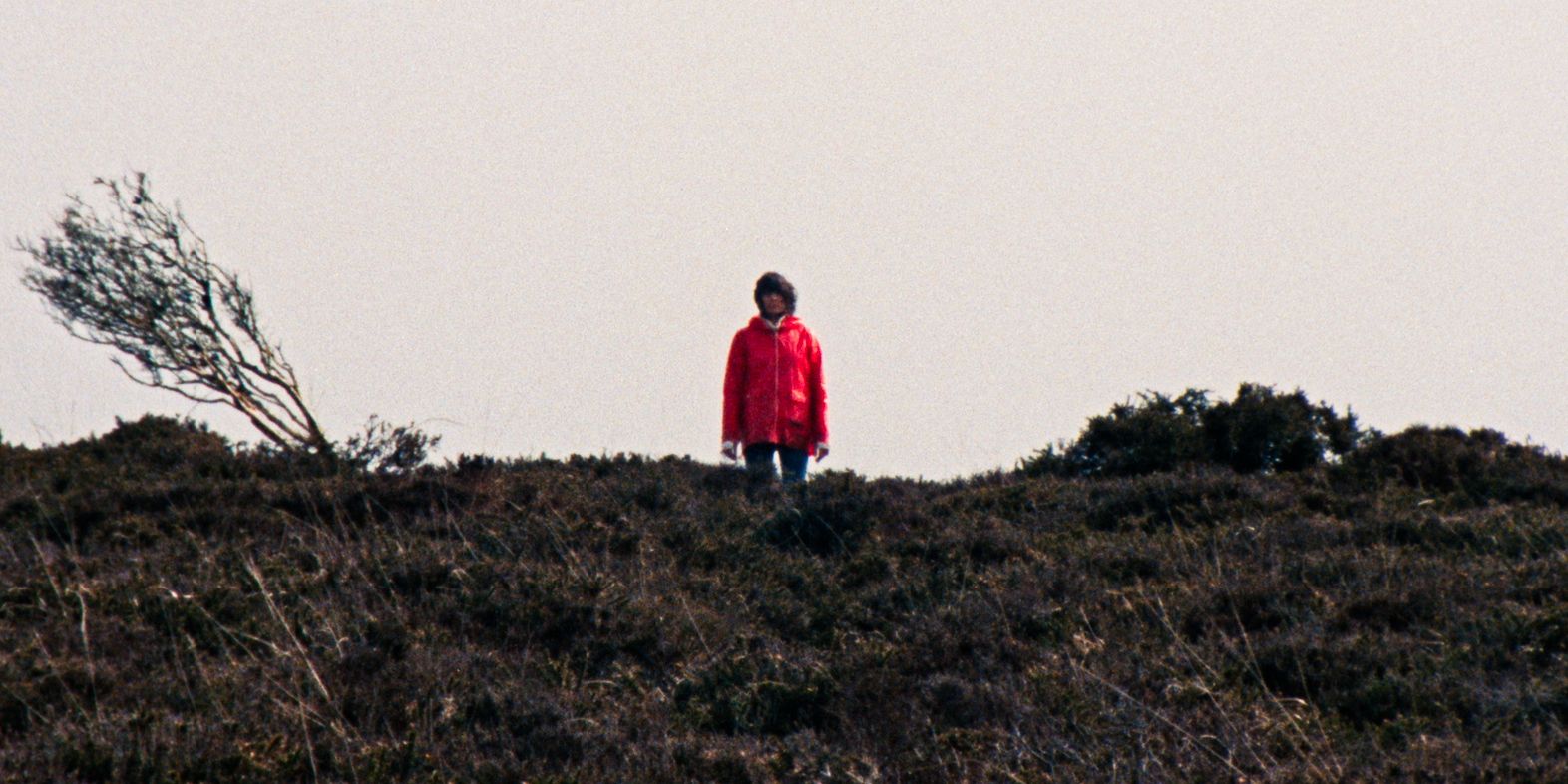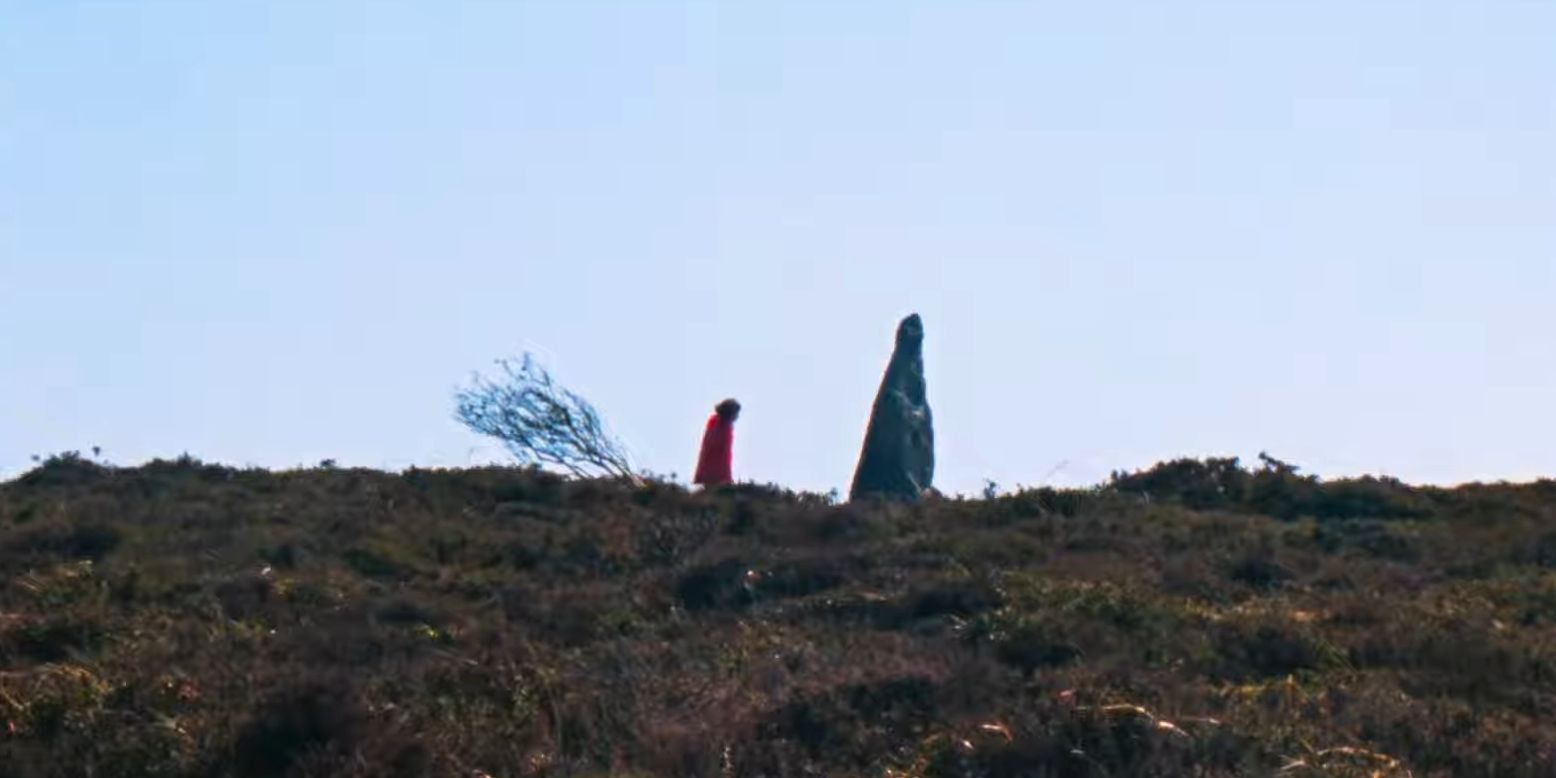Mark Jenkin's Enys Men is a film that's difficult to pin down in writing. Narratively, it's a couple steps above a Rorschach test— there are clues, but no answers, and the only thing that will be easily agreed upon between viewers is the basic premise. The experience is so affect-oriented, so predicated on meaningful repetition and the accumulation of atmosphere, that any written rendering of it will seem too literal. Those who enjoy cinema's more experimental works should seek this one out; more mainstream audiences may not find it to their liking. This critic, whose tastes fall somewhere in between, was enthralled by Jenkin's control over form, but wished there was more of a story to hold onto as the runtime stretched into feature length.
The grounding facts of Enys Men (Cornish for "Stone Island") are these: In 1973, a volunteer (Mary Woodvine) is tasked with observing a rare flower growing on an island off the Cornish coast. Each day, she must head out to the cliffside where they grow, take the temperature of the soil, and record it in a logbook. The rest of her time there appears to belong to her. She fires up her generator and listens to the radio, walks around the island, and reads by candlelight at night before bed. But a young woman (Flo Crowe) is sometimes living with her. The volunteer sees singing cultists, smiling miners, and disconcerting lichen growth. Reality is destabilized, and nothing she or the audience experiences can be taken at face value.
Being left narratively unmoored can be frustrating, but for most of the movie, that feeling is drowned out by other, more intentional ones. Enys Men's grip on the viewer is strong and immediate. The mise-en-scène, and the striking use of color in particular, so clearly evokes the era that it's almost ironic how committed the film becomes to disrupting one's sense of time. The sound design and cinematography envelop the audience in this world, and from there, the editing keeps close control of the pulse. From the outset, the volunteer's daily ritual of dropping a stone down the well outside her lodging takes on a larger importance, the weight of which is always felt. The totality of how such moments are composed is a promise that something greater is at work here.
This is what starts to push Enys Men into the realm of horror. The sensation of a larger significance to the volunteer's seemingly mundane actions could be interpreted positively, but it isn't. The film has a sinister undertone even before the imagery takes a firmly surreal turn. Pinpointing all the reasons why would take careful study, but how Jenkin handles the camera's distance from the protagonist stands out. After having tracked her from a distance as she trekked through nature, the first close-ups get uncomfortably close, highlighting the topography of Woodvine's face over a clear display of emotion or personhood. When her expressions are shown in full, the frame always seems to be a little off-kilter. The movie's form is subtly communicating that something is wrong, and those tiny artistic choices all contribute to a persistent atmosphere of dread.
The non-diegetic aspect of this — in which that sense of greater importance is experienced as the guiding hand of the artist — is also a great asset. Enys Men becomes opaque quite quickly (even as the emotional current of it remains clear), and the film's strong authorial voice helps the audience trust the process and remain engaged. For those viewers willing to give themselves over to Enys Men as a purely affective experience, this should carry them through to the end. Its perspective is so distinct and crafted with such skill that the swirling unease it conjures in one's stomach, while strangely gentle compared to other atmospheric horrors, takes awhile to fade.
But anyone looking to think their way through will find a limit to their patience. Jenkin doesn't leave the audience without any puzzle pieces; there are enough for multiple stories to be constructed, should the viewer wish to understand Enys Men on that level. At a certain point, however, it becomes so difficult to disentangle the real from the unreal that to try feels pointless, and the last act suffers for it. From a purely atmospheric perspective, there's no reason this film couldn't have accomplished what it does in, say, 60 minutes. Offering at least some hope of narrative coherence, even if that type of closure is ultimately denied, would go a long way toward holding the audience for that extra half-hour.
Enys Men released in select US theaters Friday, March 31. The film is 91 minutes long and is not currently rated.



